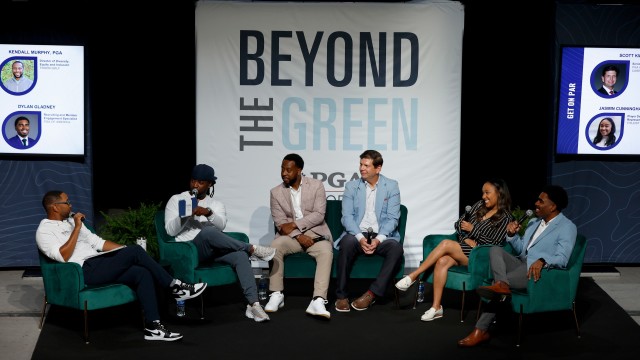Category - Amateur Programs
Building Bridges at Shoal Creek: How the Birmingham Club Has Embraced Its New Role as an Agent of Change
By Michael Williams
Published on

Since its founding in 1977, Shoal Creek Club in Birmingham, Alabama, has been a place that has attracted attention.
It immediately caught the eye of the golf world for its championship-ready Jack Nicklaus designed course, hosting the 1984 PGA Championship and U.S. Amateur in 1986. Four years later, the PGA of America tapped Shoal Creek as the venue again, this time for the 1990 PGA Championship, catapulting the course onto the national and international radar.
At that time, Shoal Creek was a segregated club that barred African Americans from membership. Two months before the PGA Championship, the club’s late founder Hall Thompson declared that Shoal Creek would not be pressured to integrate, infamously stating: “The country club is our home, and we pick and choose who we want. I think we've said that we don't discriminate in every other area except the Blacks.”
Amid the negative publicity generated by Thompson's comments, the PGA of America – led by its president, Pat Rielly – huddled to consider moving the PGA Championship away from Shoal Creek, but a compromise was reached when the club invited Louis J. Willie, a local Black insurance executive, to become an honorary member. As a result of the 1990 PGA Championship controversy, the golf industry – and sports world as a whole – was forced to look at the issue of access, and how to address it the right way.
Major championship golf would never be the same after Shoal Creek. Augusta National Golf Club, host of the Masters Tournament, invited its first Black member in 1990. And alongside the PGA of America, the PGA TOUR, USGA and LPGA adopted new guidelines that required tournaments to be held at clubs that didn’t discriminate according to race, gender, religion or national origin. The change forced many clubs around the country to reckon with their own policies — some stood firm, but several moved in a new direction.
Thirty-three years later, a new generation is facing its own challenges on the issues of diversity, equity and inclusion on and off the golf course. But this time, Shoal Creek is playing a much different role.
‘Words don’t do it justice’
As co-host of the 2023 PGA WORKS Collegiate Championship (PWCC) – the most culturally significant championship in collegiate golf – alongside Bent Brook Golf Course May 8-10, Shoal Creek is establishing itself as a both a stage for competitive excellence among minority golfers, as well as an example of how far a community can come in its ability to promote golf’s positive values.
The Championship is a 54-hole stroke play format that hosts male and female student-athletes enrolled in Historically Black Colleges and Universities, Hispanic-Serving Institutions, and other Minority-Serving Educational Institutions. All funds raised from the event go directly into HBCU golf programs, with half of the funds directed to the university programs that are within the state of Alabama.
Now in its 36th year, the PGA WORKS Collegiate Championship has hosted thousands of student-athletes over the years including PGA Professional Scooter Clark, the Director of the PGA WORKS Collegiate Championship. Clark, originally from Silver Spring, Maryland, has seen the indelible impact of the event on student-athletes during his tenure.
“Until you're part of the Championship Week and see it, videos and words don't do it justice. It's a championship, but with the different activations we have onsite with our partners and our industry leaders that are part of the week, it's more than a championship,” says Clark. “We give our student-athletes opportunities to have a conversation with PGA CEO Seth Waugh or PGA TOUR Commissioner Jay Monahan, USGA CEO Mike Whan or USGA Executive Director Fred Perpall, along with several other industry leaders.
"We have student-athletes partnered with our Black PGA members that are onsite to have career conversations and talk to them about the opportunities. We have so many of our leaders onsite, it's hard for our student-athletes to not understand what's possible.”
Birmingham leans in
Local civic leaders are also a large part of the week during the PGA WORKS Collegiate Championship. Former banking executive Bob Dickerson is a prominent business and community leader in Birmingham who loves golf and has been a valuable contributor to the Championship.
And as an African American who is from the area originally, he can also appreciate the significance of Shoal Creek as its host.
“As you know, when most people first heard about Shoal Creek, it was negative. Now, we get to use Shoal Creek to host an event that really gives an opportunity to HBCU golfers,” says Dickerson. “I think the experience that these young golfers are going to have will be tremendous.
"And then to be able to have it at a place that 30 years ago made history for what its owner said, I think it's also sort of a testimony to where Birmingham has come.”
Spurred by the wave of social awareness that emerged in recent years, golf has put some considerable effort into making the game and the industry a more welcoming and accessible place for all people. Both Clark and Dickerson see the PGA WORKS Collegiate Championship as an effective part of reaching that goal.
“To see the level of passionate commitment behind the Shoal membership to not only host the Championship, but to support our most underserved and underrepresented universities in their programs . . . I guess I would say that it feels right,” adds Clark. “Not just for Shoal, but for everybody, for our industry leaders, business leaders, everyone that wants to lean in and understand the true potential impact of this game.”
Adds Dickerson: “Events like this tournament at Shoal Creek give us a moment to pause and look back and say, ‘Yeah, we did do some good things. Now let's redouble our efforts and make more progress than we have.’ There's certainly a lot of progress that we still need to make. I think there's no question that this is a step in the right direction. The PGA, as well as Shoal Creek, understand the need for diversity, and that diversity is good for the country, and that we all ought to be open to each other – especially in our common pursuits.”
“Everybody that likes golf should welcome everybody that likes golf.”


